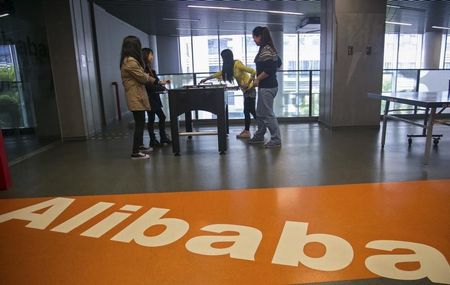By Deepa Seetharaman and Ryan Vlastelica
SAN FRANCISCO/NEW YORK (Reuters) - Investors are looking over portfolios to make room for Chinese e-commerce giant Alibaba Group Holdings Inc's market debut next month - and that means some less attractive stocks that funds are holding might be shown the door.
The initial public offering, which could top $16 billion (9.67 billion pounds) to become the largest-ever IPO by a technology company, is expected as early as next month after Alibaba management kicks off a two-week investor road show after the Labor Day weekend.
As investors take a hard look at their portfolios, it may trigger a veritable garage sale of names that are failing to impress Wall Street, including U.S. e-commerce rival Amazon.com Inc, fund managers said.
"Any company that didn't meet expectations and give a rosy outlook is probably being considered as a sale candidate to make room for a name like this," said Jim O'Donnell, chief investment officer of Forward, which has $5 billion in assets under management.
"There won't be wholesale turnovers of portfolios, but I imagine Amazon is being looked at," he added.
Chinese rivals like Baidu Inc and Tencent Holdings Ltd also may be pressured if fund managers view Alibaba, which powers 80 percent of all online commerce in China, as a better path to tap into growth in the world's second-largest economy.
Next month's roadshow is likely to attract interest from a wide range of funds, including those focussed on emerging markets and technology. Alibaba may garner a valuation of $200 billion or more when it goes public, analysts say, which would make it one of the 20 biggest companies listed in U.S. markets.
"It is the 8,000-pound gorilla coming for the stock market," Michael Reynal, portfolio manager at San Francisco-based RS Investments, said of Alibaba.
YAHOO ARBITRAGE
How investors act also depends on whether they gain a toehold in the highly anticipated IPO at all. One topic of debate is how investors who are boxed out of the IPO will play Yahoo Inc, which holds a 22.5 percent stake in Alibaba.
The U.S. web portal has struggled to reinvent its core business, but has nonetheless seen its shares more than double in the last two years on the strength of its Alibaba ties. Some investors say Yahoo Inc could be sold to clear room for Alibaba. By some measures, the company carries a high valuation, with its enterprise value to sales ratio surpassing 90 percent of the U.S. stock market, according to Starmine, a Thomson Reuters company.
On the flip side, investors boxed out of Alibaba's IPO could snap up Yahoo to capitalise on the Chinese company's growth. That argument could also help buoy shares in Softbank Corp, which has a 34 percent stake in Alibaba.
"I bet a lot of people are playing Yahoo for Alibaba and once the IPO is gone, they may exit Yahoo completely," said Paul Meeks, senior analyst and portfolio manager of the $42 million Sextant Growth Fund at Saturna Capital, which has $4 billion assets under management.
"A lot of people know they're not going to get IPO shares, so they hold Yahoo and Softbank," said Mark Yusko, who manages $4.5 billion as CIO of Morgan Creek Capital Management and has invested in Alibaba through private placements. "They want to capture the IPO pop."
TRADE-OFFS
Alibaba's debut comes at a time of growing dissatisfaction on Wall Street for Amazon's record of thin profits and heavy spending on developing television shows and hardware initiatives including aerial drones and smart phones.
The expected boom in e-commerce in China may also drive some U.S.-based investors in Chinese search company Baidu towards Alibaba.
More than 60 funds hold Amazon, Yahoo and Baidu shares, according to Lipper, a Thomson Reuters company, about 20 of which are target-date funds from Wells Fargo and AllianceBernstein, designed to favour more conservative investments as an investor's retirement approaches.
Amazon shares have fallen about 17 percent so far this year, while shares in rival eBay Inc, which also could be sold in favour of the Chinese e-commerce company, has been flat as the tech-heavy Nasdaq has risen almost 9 percent.
Amazon's operating margin over the last 12 months is about 0.8 percent while for eBay, margins are roughly 20 percent, according to Thomson Reuters data. By contrast, Alibaba boasted a 47.5 percent operating margin in fiscal year 2014, ending in March, according to its IPO filing.
Still, some analysts say Amazon is not easily replaced by Alibaba because of their relative geographic strengths.
"Amazon has a stranglehold on the U.S. market just as Alibaba has a stranglehold on the Chinese market," said Daniel Kurnos, analyst at Benchmark Co. "It will be hard for one to penetrate the other."
In 2013, Alibaba handled more online transactions than Amazon and eBay Inc and had 231 million active buyers, or the equivalent of 17 percent of China's population.

By 2020, online retail sales in China are estimated to reach $420 billion to $650 billion, as much as the United States, Japanese, UK, German and French markets combined, according to a recent analysis by McKinsey Global Institute.
(Reporting by Deepa Seetharaman in San Francisco and Ryan Vlastelica in New York; Editing by Sonya Hepinstall)
_800x533_L_1412662134.jpg)